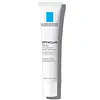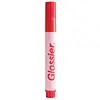What's inside
What's inside
 Key Ingredients
Key Ingredients

 Benefits
Benefits

 Concerns
Concerns

 Ingredients Side-by-side
Ingredients Side-by-side

Benzoyl Peroxide 5.5%
Water
Skin ConditioningIsostearyl Alcohol
EmollientGlycerin
HumectantPentylene Glycol
Skin ConditioningSilica
AbrasiveCarbomer
Emulsion StabilisingCapryloyl Salicylic Acid
ExfoliatingPotassium Hydroxide
BufferingTocopheryl Acetate
AntioxidantAcrylates/C10-30 Alkyl Acrylate Crosspolymer
Emulsion StabilisingDisodium EDTA
Epilobium Angustifolium Flower/Leaf/Stem Extract
Skin ConditioningBenzoyl Peroxide 5%
Water
Skin ConditioningDimethyl Isosorbide
SolventGlycerin
HumectantAcrylamide/Sodium Acryloyldimethyltaurate Copolymer
Emulsion StabilisingPropanediol
SolventNiacinamide
SmoothingCapryloyl Salicylic Acid
ExfoliatingButylene Glycol
HumectantMelaleuca Alternifolia Leaf Oil
AntioxidantCucumis Sativus Fruit Extract
EmollientIsohexadecane
EmollientSaccharide Isomerate
HumectantXanthan Gum
EmulsifyingPolysorbate 80
EmulsifyingPolyglyceryl-2 Isostearate
EmulsifyingHydroxyacetophenone
Antioxidant1,2-Hexanediol
Skin ConditioningCaprylyl Glycol
EmollientSodium Citrate
BufferingCitric Acid
BufferingEthylhexylglycerin
Skin ConditioningDisodium EDTA
Diethylhexyl Sodium Sulfosuccinate
CleansingCarbomer
Emulsion StabilisingSodium Hydroxide
BufferingDimethicone
EmollientSorbitan Stearate
EmulsifyingPEG-40 Stearate
EmulsifyingPhenoxyethanol
PreservativeSilica
AbrasiveTocopherol
AntioxidantBenzoyl Peroxide 5%, Water, Dimethyl Isosorbide, Glycerin, Acrylamide/Sodium Acryloyldimethyltaurate Copolymer, Propanediol, Niacinamide, Capryloyl Salicylic Acid, Butylene Glycol, Melaleuca Alternifolia Leaf Oil, Cucumis Sativus Fruit Extract, Isohexadecane, Saccharide Isomerate, Xanthan Gum, Polysorbate 80, Polyglyceryl-2 Isostearate, Hydroxyacetophenone, 1,2-Hexanediol, Caprylyl Glycol, Sodium Citrate, Citric Acid, Ethylhexylglycerin, Disodium EDTA, Diethylhexyl Sodium Sulfosuccinate, Carbomer, Sodium Hydroxide, Dimethicone, Sorbitan Stearate, PEG-40 Stearate, Phenoxyethanol, Silica, Tocopherol
 Reviews
Reviews

Ingredients Explained
These ingredients are found in both products.
Ingredients higher up in an ingredient list are typically present in a larger amount.
Benzoyl Peroxide is famous for fighting acne. This is because it does a variety of tasks on the skin: it helps reduce excess oil, kill bacteria, and clear out dead skin cells. In other words, it is effective at unclogging pores.
These properties make it great at fighting different types of acne, including cystic and inflammatory types of acne.
When targeting the bacteria in your pores, Benzoyl Peroxide has been shown to kill the bacteria without causing sensitivity. It also helps keep your skin's natural bacteria and biome balanced. Having a healthy biome protects your skin from external harmful factors.
Once Benzoyl Peroxide is absorbed into the skin, our bodies turn it into benzoic acid and quickly exits in urine.
When using Benzoyl Peroxide, it may be irritating for some people due to a variety of reasons, such as a broken skin barrier or just an allergic reaction. We recommend speaking with a professional about using this ingredient if you have concerns.
Learn more about Benzoyl PeroxideCapryloyl Salicylic Acid comes from salicylic acid, the famous acne-fighting BHA.
It usually goes by a more common name of LHA, or lipohydroxy acid.
Like salicylic acid, this ingredient is a chemical exfoliant that can help break down the oil in your pores and reduce inflammation.
Though studies for LHA do show it to be less effective than salicylic acid. To be fair, salicylic acid is the reigning monarch of acne treatments.
However, a study from 2009 found LHA to be comparable to BPO, making it a good alternative for people with sensitive skin. Another study of 14 patients found a significant decrease in comedones after using LHA.
Another pro of LHA? It is less irritating than salicylic acid due to its large molecule size.
Large molecules cannot penetrate skin as well, so they are gentler on the skin. LHA is much less penetrative than salicylic acid.
An in-vitro study (not done on a living organism) found only 6% of LHA penetrated past the statum corneum compared to 58% of salicylic acid. An in-vivo (done on a living organism) analysis revealed ~17% of LHA was still present in the top layer of skin after 4 days, versus ~9% of salicylic acid.
Interestingly, a study from 2008 found LHA comparable to another famous acid, glycolic acid.
This study found about 10% of LHA is as effective as 20-50% of glycolic acid in treating hyperpigmentation and fine-lines.
Hydroxy acids have been found to stimulate skin protein, lipids, and thermal thickening. This may have anti-aging benefits.
Learn more about Capryloyl Salicylic AcidCarbomer is a polymer of acrylic acid. Its main role is to create a gel consistency.
A high amount of carbomer can cause pilling or balling up of products. Don't worry, most products contain 1% or less of carbomer.
Disodium EDTA plays a role in making products more stable by aiding other preservatives.
It is a chelating agent, meaning it neutralizes metal ions that may be found in a product.
Disodium EDTA is a salt of edetic acid and is found to be safe in cosmetic ingredients.
Learn more about Disodium EDTAGlycerin is already naturally found in your skin. It helps moisturize and protect your skin.
A study from 2016 found glycerin to be more effective as a humectant than AHAs and hyaluronic acid.
As a humectant, it helps the skin stay hydrated by pulling moisture to your skin. The low molecular weight of glycerin allows it to pull moisture into the deeper layers of your skin.
Hydrated skin improves your skin barrier; Your skin barrier helps protect against irritants and bacteria.
Glycerin has also been found to have antimicrobial and antiviral properties. Due to these properties, glycerin is often used in wound and burn treatments.
In cosmetics, glycerin is usually derived from plants such as soybean or palm. However, it can also be sourced from animals, such as tallow or animal fat.
This ingredient is organic, colorless, odorless, and non-toxic.
Glycerin is the name for this ingredient in American English. British English uses Glycerol/Glycerine.
Learn more about GlycerinSilica, also known as silicon dioxide, is a naturally occurring mineral. It is used as a fine, spherical, and porous powder in cosmetics.
Though it has exfoliant properties, the function of silica varies depending on the product.
The unique structure of silica enhances the spreadability and adds smoothness, making it a great texture enhancer.
It is also used as an active carrier, emulsifier, and mattifier due to its ability to absorb excess oil.
In some products, tiny microneedles called spicules are made from silica or hydrolyzed sponge. When you rub them in, they lightly polish away dead skin layers and enhance the penetration of active ingredients.
Learn more about SilicaWater. It's the most common cosmetic ingredient of all. You'll usually see it at the top of ingredient lists, meaning that it makes up the largest part of the product.
So why is it so popular? Water most often acts as a solvent - this means that it helps dissolve other ingredients into the formulation.
You'll also recognize water as that liquid we all need to stay alive. If you see this, drink a glass of water. Stay hydrated!
Learn more about Water